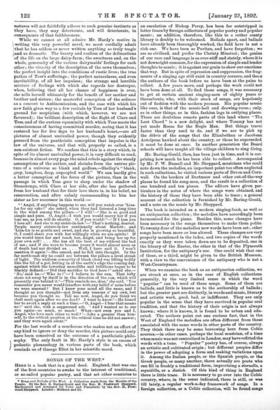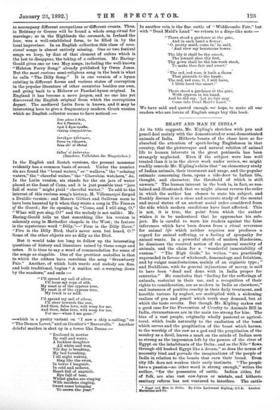SONGS OF THE WEST.* HERE is a book that is
a good deed. England, that was one of the first countries to awake to the interest of traditional, or so-called popular poetry, and that set other countries to
• Songs and Ballads of the West. A Collection made from the Mouths of the People. By the Be.. B. Baring-Ciould and the Bev. H. Fleetwood Sheppard. Harmonised and Arranged for Voice and Pianoforte by the Her. H. Fleet- wood Sheppard. London Methuen and Co. an emulation of Bishop Percy, has been far outstripped in latter times by foreign collectors of popular poetry and popular music ; an addition, therefore, like this to a rather scanty library is doubly to be welcomed. Ballads apart, and ballads have already been thoroughly worked, the field here is not a rich one. We have been so Puritan, and have forgotten ; we are so civilised, and prefer the Christy Minstrel; the genius of our race and language is so over-stiff and stately, where it is not downright common, for the expression of simple and tender thoughts to music ; it is against our grain to show our emotions that way. But in spite of repression and suppression, the frag- ments of a singing age still exist in country corners, and there the authors of the book before us have been at the pains to collect. A few years more, and perhaps the work could not have been done at all. To find these songs, it was necessary to get at certain ancient singing-men of eighty years or thereabouts, who, with their stock of songs, are hopelessly out of fashion with the modern yeoman. His popular music. like ours, is that of the music-hall and drawing-room ; only, as in other things, so in this, fashion lags in outlying places. There are doubtless remote parts of this land where " The Lost Chord" is a new delight, and where Tommy has not yet made Room for the Bogie Man. But things travel faster than they used to do, and if we are to pick up the debris of the songs that the Elizabethan or Jacobean Autolycus hawked about the country, or those he superseded, it must be done at once. In another generation the Board. schools will have taught all the village children to sing Grieg.
Mr. Baring-Gould, then, has been just in time, and it is sur- prising how much he has been able to collect. Accompanied by Mr. F. W. Bussell and Mr. Sheppard, musicians who could note down the melodies, an important point too often neglected in such collections, he visited various parts of Devon and Corn- wall. On the borders of Dartmoor and other out-of-the-way places he found his song-men, and the result is a collection of one hundred and ten pieces. The editors have given par- ticulars in the notes of where the songs were obtained, and the history of those they have been able to trace ; a general account of the collection is furnished by Mr. Baring-Gould, and a note on the music by Mr. Sheppard.
The book is intended as a modern singing-book, as well as an antiquarian collection ; the melodies have accordingly been harmonised for the piano. Besides this, some changes have been necessary in the songs themselves to make them polite. To twenty-four of the melodies new words have been set; other songs have been more or less altered. These changes are very properly mentioned in the index, and two copies of the words exactly as they were taken down are to be deposited, one in the library of the Exeter, the other in that of the Plymouth Institution, for the antiquary's use. One could wish that one of these, or a third, might be given to the British Museum, with a view to the convenience of the antiquary who is not a West-Countryman.
When we examine the book as an antiquarian collection, we are struck at once, as in the case of English collections generally, by the very limited sense in which the word " popular " can be used of these songs. Some of them are ballads, and little is known as to the authorship of ballads; but the greater part are distinctly, in words and music, literary and artistic work, good, bad, or indifferent. They are only popular in the sense that they have survived in popular oral tradition, and that the history of their origin is not always known ; where it is known, it is found to be urban and edu- cated. The authors point out one curious fact, that in the West of England the melodies are often different from those associated with the same words in other parts of the country. They think there may be some borrowing here from Celtic souroes,—in other cases, perhaps the local musician, of a time whenmusic was not centralised in London, may have refitted the words with a tune. " Popular" poetry has, of course, always an artistic and cultivated origin ; but different peoples differ in the power of adopting a form and making variations upon it. Among the Italian people, or the Spanish people, or the Greek people, or many another, there actually are poets who can fill in freshly a traditional form, improvising a simnel/a, a seguidilla, or a distich. Of this kind of thing in England there is little trace. It is necessary to go over into the Celtic country, where, in the sense indicated, there is still, or was till lately, a regular work-a-day framework of songs. In a foreign collection, or a Celtic collection, will be found songs
to accompany different occupations or-different events. Thus, in Brittany or Greece will be found a whole song-ritual for marriage ; so in the Highlands the caronach, in. Ireland the
keen, was a well-established form, to be filled in by the local improvisor. In an English collection. this class of occa- sional songs is almost entirely missing. One or two festival
songs we keep, by dint of that element of militia which is the last to disappear, the taking of a collection. Mr. Baring- Gould gives one or two May songs, including the well-known "Helston Ferry Song," already published by Owen Jones. But the most curious semi-religious song in the book is what he calls " The Dilly Song." It is one version of a hymn existing in different forms and various states of corruption in the popular literature of other countries besides our own, and going back to a Hebrew or Paschal-hymn original. In England it has become a mere jargon, and no one has yet
discovered the English original from which the corruptions depart. The mediaeval Latin form is known, and it may be interesting here to give a fragmentary modern Greek version which no English collector seems to have noticed :-- gsas pathos 6 Beds, sod ii Ilavcryla, Tin& .1.7 17ca 7fiaLga, Ticreep cianclacTac.
6toroixov 441.Acnsev,
gvvea Ta Tciyawra Sima sly' of acchaisly' 6‘Setc' of ardo-rcaol.
(Sanders, Volkgeben der N'eugriechen.) In the English and Scotch versions, the present nonsense evidently has a common basis of sound. Under the number six.are found the "broad waters," or " walkers," the "echoing waters," the " cheerful waiter," the " Cherubim watchers," &c.
In the Latin version, six stands for the six jars of water placed at the feast of Cana, and it is just possible that "jars full of water " might yield " cheerful waiter." To add to the interest of this curious song's history, M. Villemarqne forged a Druidic version : and Messrs. Gilbert and Sullivan seem to have been haunted by it when they wrote a song in The Yeomen of the Guard; for its opening is, "Come, and I will sing, 0,"
" What will you sing, 0 ?" and the melody is not unlike. Mx. Baring-Gould tells us that something like his version is solemnly sung in Methodist chapels in the West; its feature is the mysterious word ".Dilly,"—" Four is the Dilly Hour," " Five is the Dilly Bird, that's never seen but heard, 0 !" Some of the other objects are as dilly as the Bird.
But it would take too long to follow, up the interesting questions of history and literature raised by these songs and
notes. It is time to say a word of commendation for some of the songs as singable. One of the prettiest melodies is that to which the editors have rewritten the song " Strawberry Fair." Another, of which both words and melody are fine, and both traditional, begins "A maiden sat a-weeping, down by the seashore," and ends :-
"" III spread my sail of silver,
I'll loose my rope of silk, My mast is of the cypress tree, My mast is of the cypress tree, My track is as milk.
I'll spread my sail of silver, I'll steer towards the sun, And thou, false love, wilt weep for me, And thou, false love, wilt weep for me, For me—when I am gone :"
—which is a pretty variant on "I saw a ship a-sailing," on " The Demon Lover," and on Gautier's " Barcarolle." Another doleful maiden is shut up in a tower like Danae —
" Enclosed in mortar
By wall and water, A luckless daughter All white and wan,
Till day is breaking,
My bed forsaking, I all night waking, Sing like the swan, In tower I languish, In cold and Heart full of anguish, Eye full of tear, Whilst glades are ringing With maidens singing, Sweet roses bringing
To crown the year."
In another vein is the fine rattle of " Widdicombe Fair," but with "Dead Maid's Land " we return to a dirge-like note :—
" There stood a gardener at the gate, And in each hand a flower :
' 0, pretty maid, come in,' he said, And view my beauteous bower.
The lily it shall be thy smock, The jonquil shoe thy feet, Thy gown shall be the ten-week stock, To make thee fair and sweet.'
..... . . .
The red, red rose, it hath a thorn That piereeth to the heart ; The red, red rose, 0, I will have, I little heed the smart !'
There stood a gardener at the gate, With cypress in his hand, And he did say, Let no fair may Come into Dead Maid's Land.' "
We have said and quoted enough, we hope, to make all our readers who are lovers of English songs buy this book.



































 Previous page
Previous page